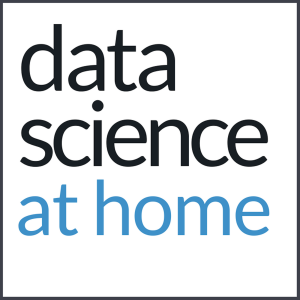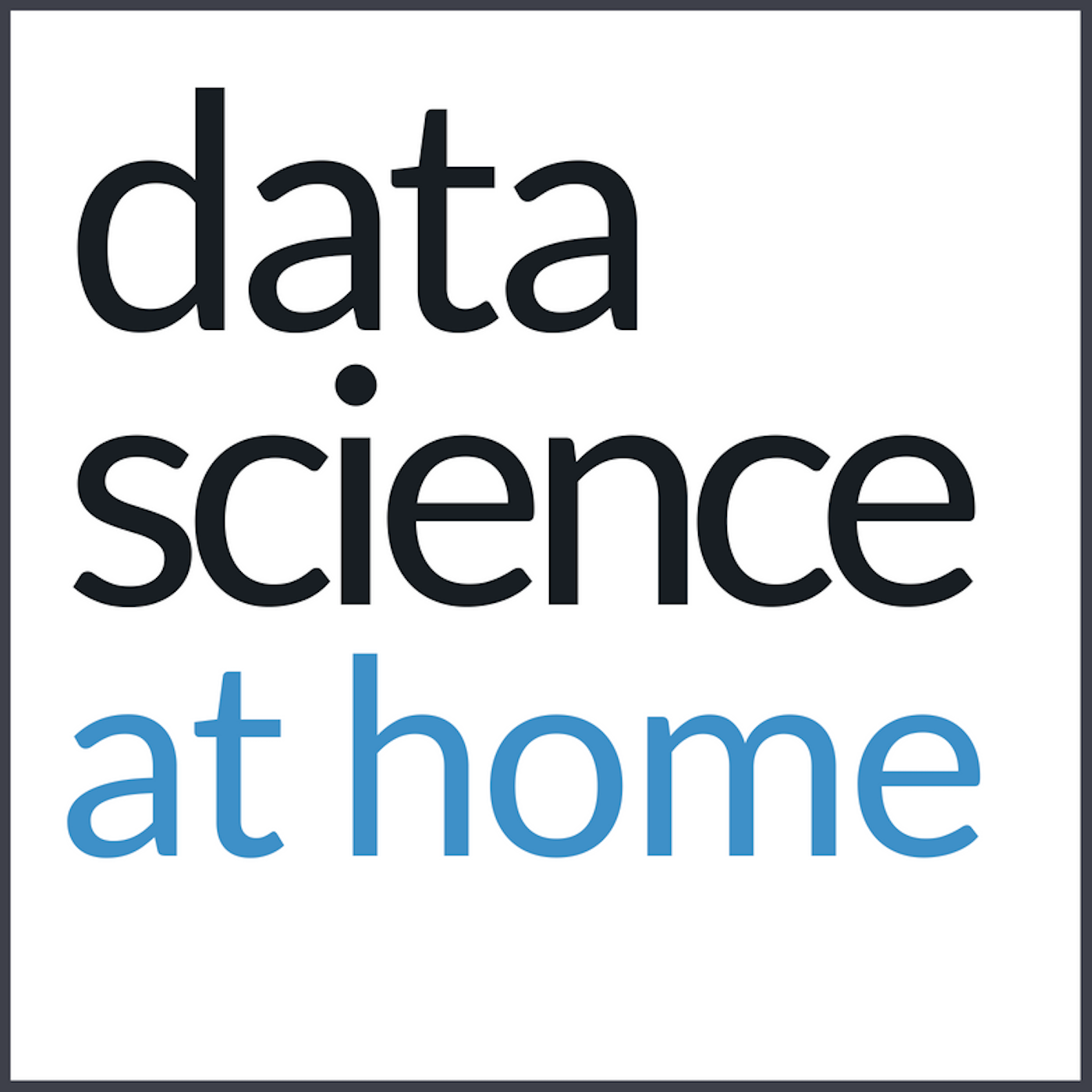Data Science at Home
Episodes

Wednesday Jan 23, 2019
Episode 53: Estimating uncertainty with neural networks
Wednesday Jan 23, 2019
Wednesday Jan 23, 2019
Have you ever wanted to get an estimate of the uncertainty of your neural network? Clearly Bayesian modelling provides a solid framework to estimate uncertainty by design. However, there are many realistic cases in which Bayesian sampling is not really an option and ensemble models can play a role.
In this episode I describe a simple yet effective way to estimate uncertainty, without changing your neural network’s architecture nor your machine learning pipeline at all.
The post with mathematical background and sample source code is published here.
![Episode 52: why do machine learning models fail? [RB]](https://pbcdn1.podbean.com/imglogo/ep-logo/pbblog1799802/logo_squared_datascience_v3_300x300.png)
Thursday Jan 17, 2019
Episode 52: why do machine learning models fail? [RB]
Thursday Jan 17, 2019
Thursday Jan 17, 2019
The success of a machine learning model depends on several factors and events. True generalization to data that the model has never seen before is more a chimera than a reality. But under specific conditions a well trained machine learning model can generalize well and perform with testing accuracy that is similar to the one performed during training.
In this episode I explain when and why machine learning models fail from training to testing datasets.

Wednesday Dec 19, 2018
Episode 49: The promises of Artificial Intelligence
Wednesday Dec 19, 2018
Wednesday Dec 19, 2018
It's always good to put in perspective all the findings in AI, in order to clear some of the most common misunderstandings and promises. In this episode I make a list of some of the most misleading statements about what artificial intelligence can achieve in the near future.

Sunday Oct 21, 2018
Episode 48: Coffee, Machine Learning and Blockchain
Sunday Oct 21, 2018
Sunday Oct 21, 2018
In this episode - which I advise to consume at night, in a quite place - I speak about private machine learning and blockchain, while I sip a cup of coffee in my home office.There are several reasons why I believe we should start thinking about private machine learning...It doesn't really matter what approach becomes successful and gets adopted, as long as it makes private machine learning possible. If people own their data, they should also own the by-product of such data.
Decentralized machine learning makes this scenario possible.
![Episode 47: Are you ready for AI winter? [Rebroadcast]](https://pbcdn1.podbean.com/imglogo/ep-logo/pbblog1799802/logo_squared_datascience_v3_300x300.png)
Tuesday Sep 11, 2018
Episode 47: Are you ready for AI winter? [Rebroadcast]
Tuesday Sep 11, 2018
Tuesday Sep 11, 2018
Today I am having a conversation with Filip Piękniewski, researcher working on computer vision and AI at Koh Young Research America. His adventure with AI started in the 90s and since then a long list of experiences at the intersection of computer science and physics, led him to the conclusion that deep learning might not be sufficient nor appropriate to solve the problem of intelligence, specifically artificial intelligence. I read some of his publications and got familiar with some of his ideas. Honestly, I have been attracted by the fact that Filip does not buy the hype around AI and deep learning in particular. He doesn’t seem to share the vision of folks like Elon Musk who claimed that we are going to see an exponential improvement in self driving cars among other things (he actually said that before a Tesla drove over a pedestrian).

Tuesday Sep 04, 2018
Episode 46: why do machine learning models fail? (Part 2)
Tuesday Sep 04, 2018
Tuesday Sep 04, 2018
In this episode I continue the conversation from the previous one, about failing machine learning models.
When data scientists have access to the distributions of training and testing datasets it becomes relatively easy to assess if a model will perform equally on both datasets. What happens with private datasets, where no access to the data can be granted?
At fitchain we might have an answer to this fundamental problem.

Tuesday Aug 21, 2018
Episode 44: The predictive power of metadata
Tuesday Aug 21, 2018
Tuesday Aug 21, 2018
In this episode I don't talk about data. In fact, I talk about metadata.
While many machine learning models rely on certain amounts of data eg. text, images, audio and video, it has been proved how powerful is the signal carried by metadata, that is all data that is invisible to the end user.Behind a tweet of 140 characters there are more than 140 fields of data that draw a much more detailed profile of the sender and the content she is producing... without ever considering the tweet itself.
References You are your Metadata: Identification and Obfuscation of Social Media Users using Metadata Information https://www.ucl.ac.uk/~ucfamus/papers/icwsm18.pdf

Tuesday Aug 14, 2018
Episode 43: Applied Text Analysis with Python (interview with Rebecca Bilbro)
Tuesday Aug 14, 2018
Tuesday Aug 14, 2018
Today’s episode is about text analysis with python. Python is the de facto standard in machine learning. A large community, a generous choice in the set of libraries, at the price of less performant tasks, sometimes. But overall a decent language for typical data science tasks.
I am with Rebecca Bilbro, co-author of Applied Text Analysis with Python, with Benjamin Bengfort and Tony Ojeda.
We speak about the evolution of applied text analysis, tools and pipelines, chatbots.

Tuesday Aug 07, 2018
Episode 42: Attacking deep learning models (rebroadcast)
Tuesday Aug 07, 2018
Tuesday Aug 07, 2018
Attacking deep learning models
Compromising AI for fun and profit
Deep learning models have shown very promising results in computer vision and sound recognition. As more and more deep learning based systems get integrated in disparate domains, they will keep affecting the life of people. Autonomous vehicles, medical imaging and banking applications, surveillance cameras and drones, digital assistants, are only a few real applications where deep learning plays a fundamental role. A malfunction in any of these applications will affect the quality of such integrated systems and compromise the security of the individuals who directly or indirectly use them.
In this episode, we explain how machine learning models can be attacked and what we can do to protect intelligent systems from being compromised.

Tuesday Jul 31, 2018
Episode 41: How can deep neural networks reason
Tuesday Jul 31, 2018
Tuesday Jul 31, 2018
Today’s episode will be about deep learning and reasoning. There has been a lot of discussion about the effectiveness of deep learning models and their capability to generalize, not only across domains but also on data that such models have never seen.
But there is a research group from the Department of Computer Science, Duke University that seems to be on something with deep learning and interpretability in computer vision.
References
Prediction Analysis Lab Duke University https://users.cs.duke.edu/~cynthia/lab.html
This looks like that: deep learning for interpretable image recognition https://arxiv.org/abs/1806.10574